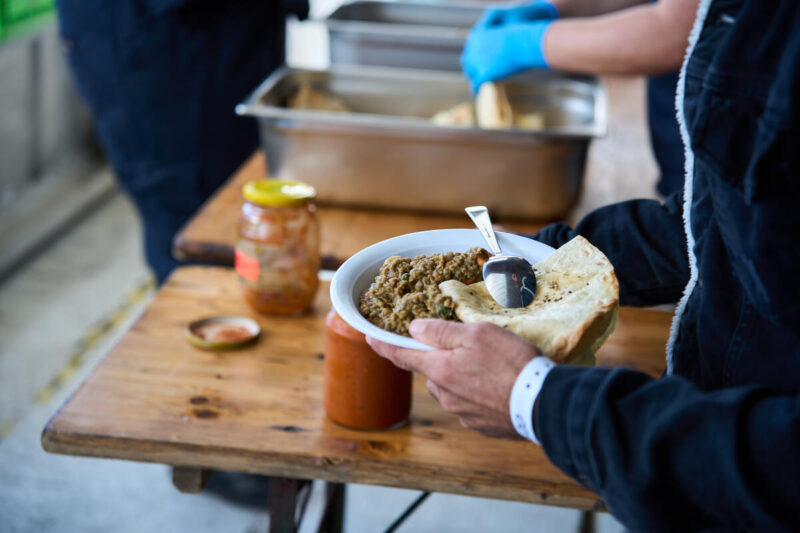“I was coming to Libya to find a way out.”

Gigi* fled from Cameroon to escape persecution. Wounded on his hand, he went through Nigeria and Libya, and finally tried to reach Italy to search for medical treatment. He was rescued by the crew of Humanity 1 in May 2024.
[Content Warnings: Death, War, Violence]
*To protect the person, their name has been changed and they are not shown in the photos.
Cameroon
I’m from Cameroon, from the English zone. We have two English regions, in the Northwest and Southwest. The French have 10 regions, they are many more than us. Many of the resources are from the English zone, like the petrol, the palm oil, and banana plantations. Everything there, is [managed by] a French. The people from the English zones are only laborers. They are the ones working on the farm and do not get a good salary. The parents cannot afford to take care of the families. When you go in the English part, many children do not go to school. They treat the English people like they are slaves in the country.
Infobox
From 1884 to 1916 Cameroon was a German colony. Afterwards, Great Britain and France accompanied the decolonization, so that Cameroon today consists of one large francophone and two smaller anglophone regions. At the start of 2016, the English language and the British legal and education system were systematically repressed in the Anglophone part. When counterprotests arose, the army and police intervened violently and eventually militarily. Anglophone separatist groups responded, and the conflict developed into a civil war at the end of 2017. The Anglophone population is still suffering from the human rights and war crimes committed by the government army, such as the murder of civilians, mass arrests, torture and sexual assaults.

In 2016 we started having a crisis. The teachers and lawyers were striking. The parents, the fathers, the mothers, all the children, they were protesting on the street. They wanted to meet the government to complain. That same day people marched; I was also there. But they did not allow the people to get in. But the government didn’t give them an ear. That is when the youth decided to stand up for their rights. That was 2016. I was 18 years old.
So then [2016] they [the army and police] started treating people bad, they beat people. They started shooting the first man in April [2017]. The first person the military shot in front of us felt as surreal as in a dream. And that is when the English decided to found their own groups and to find weapons. But you cannot identify them, because they don’t have a uniform. They started shooting each other. Sometimes if the boys killed one soldier [from the other side], you knew that the whole of that [English] village would go down. Just because of that one man, because they couldn’t identify him. They just said: “Oh, they’re civilians”. They came and started killing.
When they burned our house, I needed to take my family to the refugee camp, and I had to find my own way out, because they were searching for men. When I had to leave that same day, they knocked me down with a gun. I can’t even recall that moment because when they hit me, I fell into a gutter. They just hit me and passed. There were other people, on the other side of the road that came back. I lost too much blood. I was unconscious for about two days.
Nigeria
I took myself, with the [wounded leg and] hand, to Nigeria. That is when the hurting started. I was supposed to go for an operation, but I couldn’t afford that, at that moment. Me and my friends, we decided to go to Libya, because Nigeria is not easy. To be in a strange land you don’t know, it’s very difficult. I was coming to Libya to find a way out. Because of the hand, I can’t do anything, I can’t really work. If I use the hand like an hour to work, it will start hurting me.
Libya
When I arrived in Libya, I met an Arab man. He took me to a general hospital. They did a scan. The doctor said I could be treated, but they would have to take me to Italy. But I couldn’t afford the price they were asking.
We got out and we worked in construction. That is how they released us. Through the job. Later, we tried the second time. But we were caught again. They took us to prison, they tormented, they beat us. People even died in the prison. They don’t release you, so if you don’t have an opportunity like a job, that you can do, you will die there. They say they are doing that, because they don’t want us to be going on the water. They want, that if they release you, you will never have the mind to continue the journey. So, the second time, same thing, I still needed a job, to get out.

Rescue
This [third] time around, we prayed to God. At 1 a. m. in the morning our engine had problems. Finally, the Humanity 1 came and helped us all. In Italy, I don’t want to just go there to for my hand or to do any kind of job. I would like to go back to school. Building and construction is my dream, so I want my hand to be fine again. And then I know that my family can have something to eat.
Things are not better in my country. Things are going worse. They have burned our cocoa farms, because the English part is mostly based on farming. Children have been six years without going to school. People are still dying.
[This interview was carried out by Sofia Bifulco, Communications Coordinator during Humanity 1’s 12th rescue mission.]


